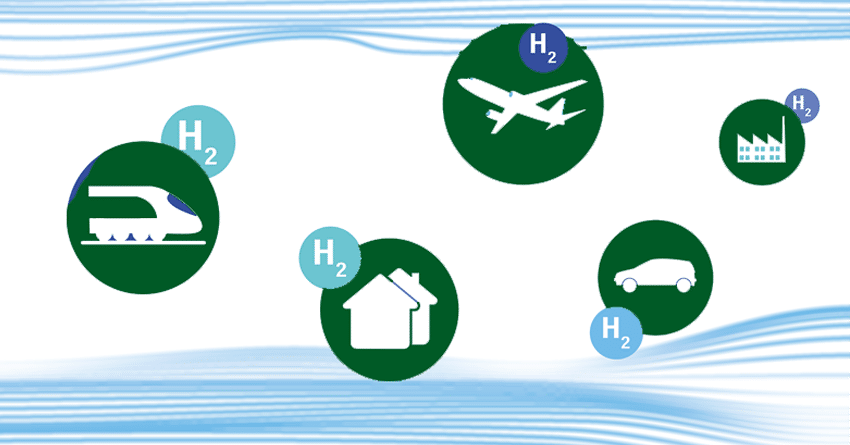With emissions difficult to fully eliminate from certain parts of the economy, most experts agree that green Hydrogen is essential to meeting the goals of Net Zero by 2050. Urging the Government to publish its Hydrogen Strategy sooner rather than later, it has confirmed support of the crossover in a domestic setting but is yet to announce a defined strategy for the commercial industries. So, will the UK turn to Hydrogen use everywhere?
What are Blue and Green Hydrogen?
Blue Hydrogen:
is when natural gas is split into hydrogen and carbon dioxide (CO2) with the use of either Auto Thermal Reforming (ATR) or Steam Methane Reforming (SMR). The CO2 is captured and then stored, reducing emissions into the atmosphere reducing environmental impacts on the planet.
Green Hydrogen:
Is hydrogen fuel that is created with the use of renewable energy in place of fossil fuels. It has potential for manufacturing, transportation and much more, with clean power and water the only by-product.
The advantages of switching to Blue and Green Hydrogen
Hydrogen has many advantages as it is abundant and supply is near limitless. It can be used on site of production and/or hydrogen is capable of being transported elsewhere if required. The environmental advantages of hydrogen are it contains almost three times the energy of fossil fuel use, therefore less will be needed to do the equivalent work.
Another advantage is hydrogen, unlike current methods, can be produced from excess renewable energies, and wherever there is water and electricity to generate more electricity or heat, for longer periods of time, in much larger quantities.
The disadvantages of switching to Blue and Green Hydrogen
Highly flammable in concentration and light compared to other fuels, as with other commonly used fuels, such as natural gas and propane, Hydrogen needs to be handled with caution. Hydrogen’s lightness does mean that it will disperse quickly into the atmosphere should there be a leak, reducing the danger of ignition. This is particularly important if hydrogen is to be transported via the existing gas infrastructure. Hydrogen moves differently from natural gas and is more likely to escape from older pipework than natural gas, so there will be concerns over the safety of a network seen to be leaking hydrogen.
In addition, the capturing process will increase the methane and propane burden so hydrogen production may not be as environmentally friendly as many may be lead to believe as
Environmentalists opposing the switch to Hydrogen
Environmentalists have openly been warning the Government to ignore the “hype” of Hydrogen to provide heat within the UK. As the Government pushes for its’ Net Zero goal, proposed plans suggest for new natural gas boilers (domestic) to be phased out in the foreseeable future and replaced with Hydrogen-ready alternatives. But environmentalists are pushing for electrical heat pumps to be endorsed over Hydrogen, which they believe is not environmentally benign.
Hydrogen for commercial use
With around half of the UK’s energy consumption being used for heating and contributing towards a third of greenhouse gas emissions, reducing carbon from the heating and hot water industry supply is a key issue for the UK to meet the plans set out for Net Zero by 2050.
Hydrogen has seen lots of traction over the years as a replacement for fossil-based gasses, converting the existing gas infrastructure to be used with Hydrogen low carbon alternatives in the UK.
One of the biggest difficulties to overcome with the crossover to Hydrogen will be the sheer scale of installation of the new appliances within current buildings. However, there are clear advantages of using existing familiar infrastructure, reducing the need for extensive remedial works that would be seen with an electric-only alternative. Other than the boiler/water heater replacement, pipework, tanks, and heating emitters such as radiators would remain unchanged. This helps avoid major issues caused by the limitations of existing space and accessibility.
Our take…
What is clear, is that hydrogen is not going to be the holy grail of zero-carbon heating for commercial projects. The simple truth is that it would be currently impractical to switch the gas grid to 100% hydrogen for zero-carbon heat, despite the existence of the extensive natural gas grid in the UK.
Producing bulk hydrogen from renewable electricity is also still expensive, and any produced by ‘surplus’ renewable electricity is not expected to meet the scale of demand. The production of low carbon hydrogen at scale will rely on using imported natural gas and deployment of carbon capture and storage (CCS) to offer a cost-effective route to produce lower volumes of hydrogen. Even when using CCS, it is important to realise hydrogen from fossil fuels will not be zero-carbon.
But, in terms of cost-effectively reducing emissions from energy use to a very low level by 2050, producing hydrogen via a low carbon route and storing it at scale makes it a potentially valuable complement to electrification.
With the practical provision of Hydrogen still some years away for the majority of the UK, Adveco, with its’ broad experience in gas and electric water heating, plus low carbon and renewable alternatives is perfectly placed to consult on short-, mid- and long-term options for your commercial projects, whether new build or refurbishment.
















